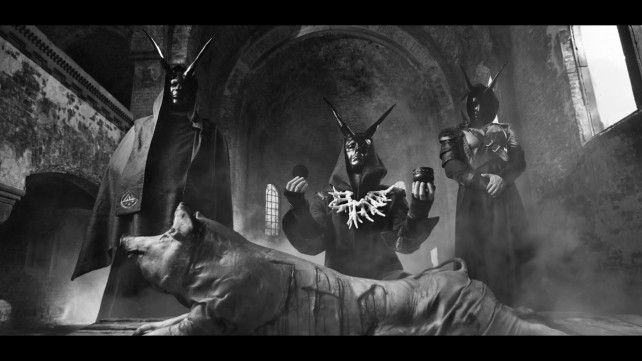Well, Yellers! The day finally arrived. The Satanist has emerged from the bowels of hell in North America. February 4, 2014, may go down as the historic day when life on Earth failed, when the sun went black, when the oceans ran red, when Gabriel and six other angels blew their trumpets, and when Behemoth was the harbinger of it all.
 Yes, it’s true, Behemoth brought The Satanist to life, and it’s fan-fucking-tastic. The Polish band’s 10th studio album is definitely one of the most anticipated albums of the year, and it has been so for good reason.
Yes, it’s true, Behemoth brought The Satanist to life, and it’s fan-fucking-tastic. The Polish band’s 10th studio album is definitely one of the most anticipated albums of the year, and it has been so for good reason.
The Satanist has already been deemed the band’s best album to date, and while I honestly can’t attest to that because I haven’t heard Behemoth’s entire catalog, I can tell you that it is a powerful album deserving of multiple listens.
In the past, vocalist and principal songwriter Nergal has gone on record to say that he doesn’t like Behemoth being genre classified, specifically as a black metal band, and this album is a perfect example why.
I don’t think anyone will argue with me if I say that The Satanist, and Behemoth, is a black metal album at its core. OK, maybe Nergal will. However, this album does a masterful job of taking you in and out, up and down, and through various heavy metal genres — such as doom, thrash, gothic, and very trace hints of groove — while always hovering close to black metal. In particular, I love the shifts in style and melody that’s present in many of the tracks.
The Satanist: The Tracks
I’ve previously commented on the “Blow Your Trumpets Gabriel” track, and after having heard The Satanist in its entirety it remains among the album’s most powerful songs. It’s heavy, slow (at times), and driven… and that bass line from Orion, my god, it gets you in the gut like a gorilla.
Behemoth “Blow Your Trumpets Gabriel” from Metal Blade Records on Vimeo.
“Messe Noire” (translated to “Black mass”) is definitely a black metal track with death metal influences. At times you get a nice grinding guitar, and at others you’re treated to an almost lullaby guitar melody with franetic snare action. But, as the song takes you into its homestretch, the tone is almost trance inducing, then, holy shit, the song’s last quarter is doomy with its riffs and the solos are just classic metal.
“Ora Pro Nobis Lucifer” starts off like an old occult-influenced thrash anthem, but before you know it you’re in Amon Amarth territory. The coversation between the lead guitar and the ride cymbals is amazing, as is the chorus. Again, this track has a major shift in tempo and melody in its second half, twice actually. First it treads on Black Sabbath territory, and second, it comes close to the hardcore punk and goth metal sounds of Type O Negative.
The Satanist has its share of the balls-out death metal tracks, such as “Furor Divinus” and “Amen,” the latter being the album’s cool drum track. Also, with a sweet bass line and a slowed pace in its second half, “Amen” proves that you can and should add variety to the straight-forward, in-your-face death metal songs. I’m not a huge fan of the snare blasts, so when a band can use those and then change it up, I really appreciate that.
You’re going to love the title track. It has a great intro, an amazing vocal melody, an insane groove, the subtlest of choral background vocals, and it finishes with everything… snare blasts, guitar solos, horns, frantic riffing. The song is a masterpiece.
Given the promo videos leading up to the album’s release, “Ben Sahar” and “In the Absence ov Light” are the songs you’ve been expecting as they capture the mood and tone of those videos. Fantastic songs, each.
“O Father O Satan O Sun!” is a perfect closer to *The Satanist. It is a quintisential Behemoth song: heavy, dark, cerbrial, and more.
Produced by Behemoth, Daniel Bergstrand, Wojciech Wiesławski, Sławomir Wiesławski









